
Here is the review from The Morocco Times by Houda Filali-Ansary.
La Vie Volée is about the unlikely friendship of Nahdi Alam, a man belonging to Casablanca's upper class and Dorha, a maid who had been working in houses since she was a child.
Despite belonging to different social classes, the solitary writer and the traumatized woman end up trusting each other, and she accepts to tell him her story.
Soon afterwards, her words start influencing her friend's writing. They eventually fall in love, only to start living with the fear that people around them discover their ‘crime.'
Beyond the love story, this novella is about the hidden reality of life within the homes of Casablanca's bourgeoisie where the two extremes of the Moroccan social ladder share the same roof.
It draws an uncompromising portrait of the privileged, especially upper class women of which several harsh portraits can be found, such as the “good” family housewife who married, at 16, a rich man twenty years her elder or the lawyer and well renowned human right militant.
The book throws an uncompromising look at the extreme luxury in which they live and the frustrations they all too often take out on their dehumanized employees.
It also presents a detailed image of the life of servants in such houses, the networks employing them and the excesses they are subjected to, like that old “Dada,” the descendant of a Sudanese slave, transmitted like a family possession until her death, or that 8-year-old who becomes the toy of her mistress's three-year old son.
Despite a rather complicated style that can make the book and a conclusion obvious right from the first pages, this novel remains worth reading as it gives a quite realistic overview of the Moroccan social reality.
It is a pity though that the author chose to present caricature-like characters: one can understand that maids are shown as victims, and even that the main character, Nahdi Alam is a personification of Mr. Nice guy, but presenting all the house mistresses as cynical, devious, even sadistic characters, all their husbands as corrupt and their children as psychologically destroyed since early childhood does no feel really realistic.
But then, sometimes, reality can be much harsher than in novels. Just think of the story of Halima, the 12-year-old who, a few weeks ago, threw herself from a balcony in fear of her mistress's anger. He crime? She had broken a bowl.
Tags: Morocco, Fes, Literature,

1 comment:
I hope it becomes available in English so I can read it. My French is very bad!
Post a Comment